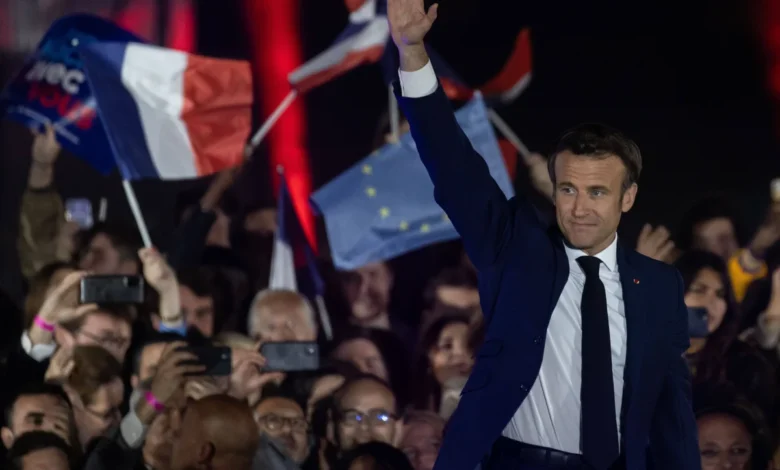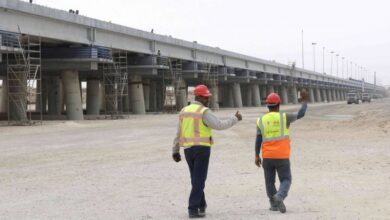Macron has to stop hiding behind the Olympics – and name a prime minister

By Pauline Bock- “The Guardian” :
By refusing to confirm the election-winning leftwing coalition’s candidate, the president is looking more and more autocratic
When one political bloc ranks first in the vote… that bloc has won. That’s the logic, that’s the tradition. Macron must name as prime minister the pick of the Nouveau Front Populaire (NFP). That fact that he has already refused to do so is a negation of democracy.”
That is conservative politician Charles de Courson calling on president Macron to respect French political tradition and name the newly selected NFP candidate, Lucie Castets, as prime minister. When even politicians on the French right are coming to the aid of a leftwing alliance and criticising the president’s disdain for parliamentary procedure, you know a line has been crossed.
The current standoff at the centre of French politics began when the Nouveau Front Populaire – which includes the Greens, Socialists, Communists and radical left party La France Insoumise – came first in the snap parliamentary election with 182 out of 577 parliamentary seats. As tradition dictates, this allows the NFP to choose the next candidate for prime minister, who will, in turn, nominate a government. After several failed attempts, the leftwing coalition agreed on a name: Castets, a 37-year-old senior civil servant who has worked at the general directorate of the treasury and the French anti-money-laundering authority. She has already said she is willing to compromise with all parties (except the far right) – a necessity if legislation is to be passed, given the NFP’s narrow win.
But Macron has refused to ask her to take up a position as prime minister, and has said he will not name a new one before the end of the Paris 2024 Olympic Games. With the Paralympics ending on 8 September, that’s almost six more weeks of political limbo. In truth, no one knows when Macron will deign to name someone: he revels in being in full control of the agenda. The constitution states that “the president names the prime minister”. It does not stipulate that the PM must be chosen from the largest parliamentary bloc, although when he found himself in this pickle, President François Mitterrand said he would “naturally align his choice with the will of the people”. The risk, otherwise, is to lose a vote of no confidence in the premiership. And so the decision can only be made by Macron – making him “the master of the clocks” as he somewhat pompously likes to call himself.
His logic for delaying – at least in his public statements – is a little confused. Speaking to public broadcaster France 2, he said that “the issue is not whether we have a name, but whether we can have a majority at the Assembly, so that a government can pass reforms and a budget, and move the country forward”. Usually, however, naming a new prime minister is the first step towards a majority. Once chosen, the new PM has the political authority to begin forming alliances to vote on reforms and budgets, and thus attempt to govern.
But what does the president really seek to achieve in dragging his feet? By putting French politics on pause for a duration of his choosing, Macron hopes for the leftwing alliance to deteriorate enough for the situation to turn in his favour. His theory: the French want an “Olympics truce” and to forget, for a time, about politics. It’s not impossible that the left could implode in this period: the longer Macron waits, the more time for this alliance of wildly diverse parties to shatter over policy differences.
Yet they have a common programme – Macron’s party and its potential allies, the rightwing Républicains, can’t say as much. In truth, this is the last ditch gamble of a president running out of road – and he has no one to blame for his desperate position but himself. After calling a snap parliamentary election in response to the far-right surging in the disastrous European election results, his party lost 76 seats, cratering its already shaky majority. It is said that he hoped he would be able to anoint the leader of National Rally (RN), Jordan Bardella, as prime minister in a bid to discredit him in time for the 2027 presidential election. But now, his gamble having failed, he childishly refuses to crown a new prime minister from the winning alliance.
Many on the left have condemned his manoeuvring as dangerous and autocratic: he is effectively denying the NFP its parliamentary victory, however small the margin of its success. And there are other causes for concern. Despite having officially resigned, his outgoing government continues to name people to positions of power at the country’s central administration. Writing to the head of France’s Conseil d’État, the authority in charge of protecting the constitution, the Socialist leader Olivier Faure – his party a coalition member of the NFP – denounced this situation as “extremely problematic”. “Never before has a government [that resigned] ‘kept the lights on’ for so long,” Faure wrote. “Especially at a time when parliament is out of session and therefore, unable to act as an efficient monitor.” The Socialist leader warned the nominations “constitute an abuse of power”.
The NFP is knocking on the door, and waiting to be let in. Macron, meanwhile, is throwing various other candidates’ names at the media, trying to see if one sticks. So far, no such luck: a unity candidate who was acceptable to rightwing Républicains would create divisions within Macron’s own ranks, and even if they were able to create a new formation, the bloc wouldn’t have enough seats to command a majority in parliament. Speaking to the French press on Sunday, Lucie Castets said: “The president of the republic must put an end to the unprecedented paralysis our country is going through. He must take the results of the parliamentary elections seriously and let the bloc that led these results rule the country.” It is time for Macron to stop sulking and do the right thing.





